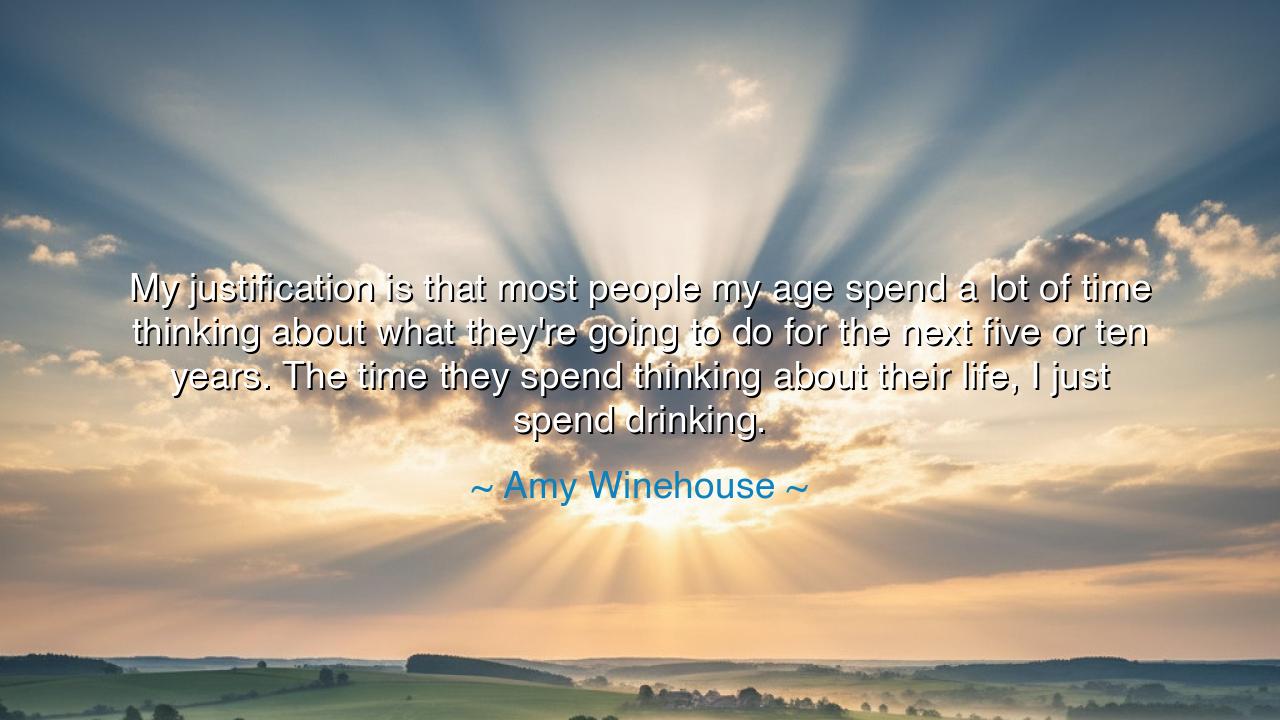
My justification is that most people my age spend a lot of time
My justification is that most people my age spend a lot of time thinking about what they're going to do for the next five or ten years. The time they spend thinking about their life, I just spend drinking.






In the fleeting moments of youth, we often find ourselves consumed by the question of the future. It is a question that echoes through the ages, a call to every generation to shape its destiny. The wise among us may seek to plan, to strategize, to build a life that stands tall and strong for years to come. But as Amy Winehouse so poignantly and provocatively states, "My justification is that most people my age spend a lot of time thinking about what they're going to do for the next five or ten years. The time they spend thinking about their life, I just spend drinking." These words, sharp with truth and heavy with the weight of personal experience, reveal a profound contradiction—the tension between planning for the future and living fully in the present. Winehouse's statement challenges us to consider whether the pursuit of certainty is truly the key to a fulfilled life, or whether it is the embracing of the moment that holds the greatest meaning.
From the dawn of civilization, the ancients have spoken of the wisdom of living in the present. The Greek philosophers, notably Socrates and Epicurus, often cautioned against the temptation to fixate too much on the future, urging instead a life grounded in the joy of the now. Socrates believed that true happiness comes not from accumulation of things or planning for an uncertain future, but from a life examined and lived with awareness. He often said, “Know thyself, and through this knowledge, embrace the fullness of the present moment.” To Socrates, the very act of thinking too far ahead often distracted the soul from the richness of the present, where real understanding could be found.
Consider the story of Epicurus, who lived with a sense of serenity and joy despite the challenges of his time. He taught that happiness comes not from wealth or future success, but from simple pleasures—friendship, good food, and the peace of the present moment. Epicurus was not against ambition, but he warned against the trap of desire for things yet to come. In his view, it is the pursuit of inner peace and living simply that leads to a truly fulfilled life. Amy Winehouse’s statement echoes the spirit of Epicurus’ philosophy—while others around her may have been consumed with thoughts of what the next five or ten years would bring, Winehouse chose to indulge in the present, finding solace in the fleeting moment. In this way, she, too, embraced the impermanence of life.
Yet, Winehouse's words are not to be taken lightly. Her statement also points to a disillusionment with the pressures of society, a recognition that, despite all the planning and striving, life remains uncertain. It is a bold declaration that the future—though important—is not something that should paralyze the present. The ancients warned against the obsession with the future, as it often leads to anxiety, fear, and discontent. The Buddha spoke of the dangers of desire, explaining that a life dominated by striving for things yet to come only causes suffering. The present moment, he taught, is the only place where true peace can be found. Winehouse, in her raw honesty, taps into this truth—she chooses to live in the moment, to take refuge in the here and now, rather than in a future she cannot control.
Of course, the danger in this mindset is not lost on us. To live entirely in the present without any thought of the future can lead to recklessness, to excess, to a loss of direction. Yet, there is a balance to be struck. The ancient wisdom of the stoics, such as Marcus Aurelius, tells us that we must live with purpose but without attachment to the outcome. He taught that we must live each day to the fullest, but with the understanding that the future is out of our hands. Winehouse, in her candid reflection, chose to live with an openness to life, not bounded by the future, but immersed in the present’s intensity.
What can we learn from Winehouse’s words and the teachings of the ancients? There is wisdom in balancing the future and the present, in recognizing that while planning is essential, it is the moments we live today that shape the course of our lives. The challenge is not to live aimlessly, nor to be consumed by constant thoughts of what is to come, but to find joy in living now. Winehouse’s way was bold, at times reckless, but it reflected a truth—the present is the only time we truly have. And in that present, there is a deep beauty to be found.
So, let us live with awareness, understanding that life unfolds in its own rhythm. We can plan for the future, but we must not forget to embrace the now. Let us spend time with those we love, reflect on our lives, and enjoy the small moments that offer the greatest joy. Life is fleeting, and though the future will come, it is the richness of today that truly shapes the course of our journey. Let us honor the present, knowing that when we live fully in the moment, we are not just drinking away time, but embracing the gift of life itself.






AAdministratorAdministrator
Welcome, honored guests. Please leave a comment, we will respond soon